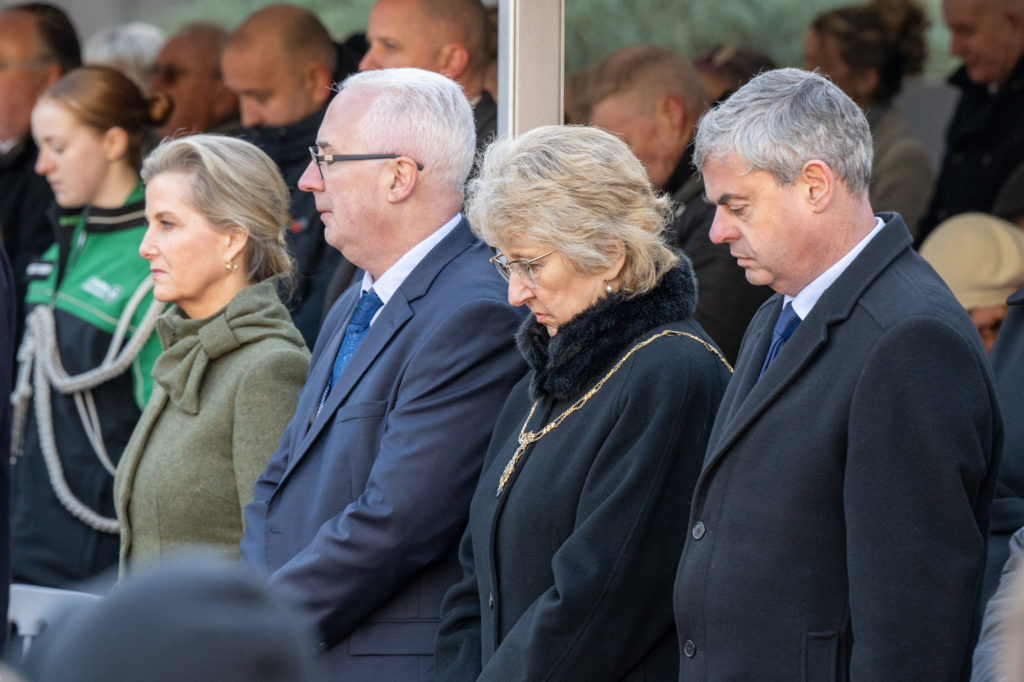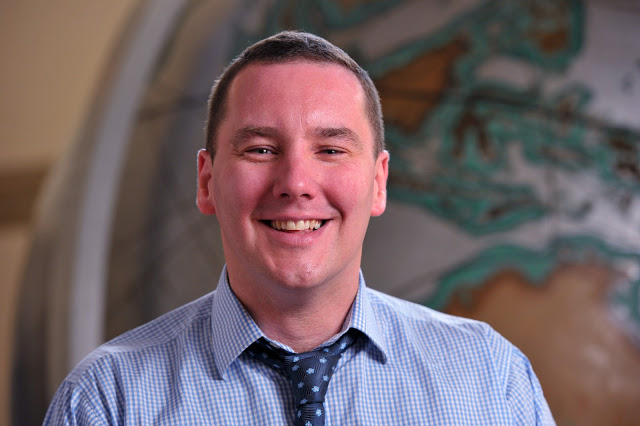The Irish Post's PETER KELLY attended the memorial service which marked the 50th anniversary of the pub bombings
 The Irish ambassador to the UK, Mr Martin Fraser (right) observes one-minute silence. On the far left is Sophie, Duchess of Edinburgh, standing beside CEO of Birmingham Irish Association Maurice Malone, and Lady Mayoress Mrs Barbara Woods (image by Chris Egan)
The Irish ambassador to the UK, Mr Martin Fraser (right) observes one-minute silence. On the far left is Sophie, Duchess of Edinburgh, standing beside CEO of Birmingham Irish Association Maurice Malone, and Lady Mayoress Mrs Barbara Woods (image by Chris Egan)TRIBUTES from King Charles and President Michael D Higgins led the commemorative service of the 50th anniversary of the Birmingham pub bombings after the city came to standstill to observe a one-minute silence.
Hundreds gathered at the permanent steel tree memorial outside the city's New Street Station to remember the 21 victims of the suspected IRA pub attacks in 1974. In a high security, invite-only service, Sophie, Duchess of Edinburgh and Martin Fraser, Irish Ambassador to Britain read tributes from Buckingham Palace and Aras an Uachtaráin as victims' families looked on.
King Charles in his message said: "As you come together to mark fifty years since the terrible events of 21st November 1974, my wife and I would like to take this opportunity to say that you and all those affected by this dreadful attack remain very much in our thoughts.
"I must also express my sincere admiration for you, the people of Birmingham, who have lived so courageously with the grief of that day and the days that followed. Your exceptional strength of spirit and resolve has truly embodied this wonderful city's elemental motto: Forward."
Michael D Higgins' message from Dublin paid tribute to the families' years' long efforts for a public enquiry. "The quest for truth and justice for those killed and injured has been a source of further pain, compounding as it does the anguish of those left behind," the Irish president said.
He added, "I sincerely hope that all those involved in addressing the painful legacy of the Troubles can summon the spirit of understanding in the story of our shared journey towards peace and reconciliation that you all here today have so courageously demonstrated."
Former Conservative Mayor of West Midlands Andy Street joined Labour minister and Birmingham MP Jess Phillips in a show of unity as they read out the names of those lost. Members of victims' families laid individual flowers as their loved ones' names were called.
Paul Bridgewater spoke on stage representing the Birmingham families' voices and his individual loss. His father Paul Davies was 17 at the time of the bombings.
He said: "Losing my dad before I was born makes me reflect on the things I missed out on, but also the things he missed out on.
"I hope he would be proud of the man I am and how we are still fighting for truth, justice and for the 21 who sadly lost their lives and the many others injured and affected by the tragic events on that fateful night, 50 years ago."
Maurice Malone Chief Executive Birmingham Irish Association was also in attendance.
The service concluded with a poem-rap performed by local artist Joe Cook and songs from local school, Bishop Challoner Catholic College. Football fans laid wreaths at the site, and Birmingham City FC observed a minute's silence from their team and urged supporters to follow.
Later in Birmingham Cathedral at a packed service open to the public, Archbishop Bernard Longley paid tribute to the families' ongoing resilience. He said, "Wounds leave scars and scars are a reminder of the trauma but also of the healing. They're often stronger than what they have replaced."
What I've learned in covering the Birmingham families' campaign
By Peter Kelly
FOR over a decade, I've accompanied the Birmingham survivors’ group on their quest for justice.
Campaigner Julie Hambleton remains an admirable force to be reckoned with. She epitomises the dignity, humanity and courage of those left behind after such atrocities. She simply won't give up. A modern-day type of Erin Brockovich, she is the pride of Birmingham and an exemplary crusader for accountability from former paramilitaries, failed policing practices and an unresponsive political system.
Against persistent eye-watering odds, she has kept the pub bombings issue on the national agenda. I have watched in admiration as Mrs Hambleton joined other survivors' groups to campaign in parliaments in London, Dublin and Belfast, and was rightfully lauded by President Michael D Higgins inside Aras an Uachtaráin for the families' efforts and resilience. Her networking has brought in policy makers from different parties and countries, even up to United Nations' research centre level in the United States.
Mrs Hambleton retains the services of KRW Law, a formidable fighting force. Now the focus has to be on the potential impact of local Birmingham MP Jess Philips who has long supported the families’ campaign for a public inquiry, yet is now in a position of unique influence as parliamentary under secretary of state in Keir Starmer's new Labour government.
This week's 50th anniversary is an historic milestone. Let's hope that the Birmingham campaign benefits from the overwhelming support demonstrated. And like counterparts in Omagh, is in a final and ultimately successful phase for justice and accountability.
 Peter Kelly
Peter KellyThe Birmingham Six
The Birmingham Six were a group of six Irish men wrongly convicted of carrying out the Birmingham bombings in 1974. The men—Hugh Callaghan, Patrick Hill, Gerard Hunter, Richard McIlkenny, William Power, and John Walker—were arrested shortly after the bombings and convicted in 1975 based largely on confessions extracted under duress and flawed forensic evidence.
The case was a huge miscarriage of justice. Allegations of police brutality and fabricated evidence emerged over the years. Campaigns for their release garnered widespread public support, highlighting systemic issues in the criminal justice system, including anti-Irish prejudice.
In 1991, after 16 years in prison, their convictions were quashed by the Court of Appeal due to unreliable forensic techniques and the exposure of police misconduct. The case led to public outrage and significant reforms in the British legal system, including changes to how evidence and confessions were handled. The Birmingham Six’s ordeal remains a sobering reminder of the consequences of rushing to judgment during times of fear and political unrest.
The surviving members are Paddy Hill and Hugh Callaghan. Paddy Hill has been active in advocating for justice reform, highlighting the challenges faced by individuals wrongfully convicted.

